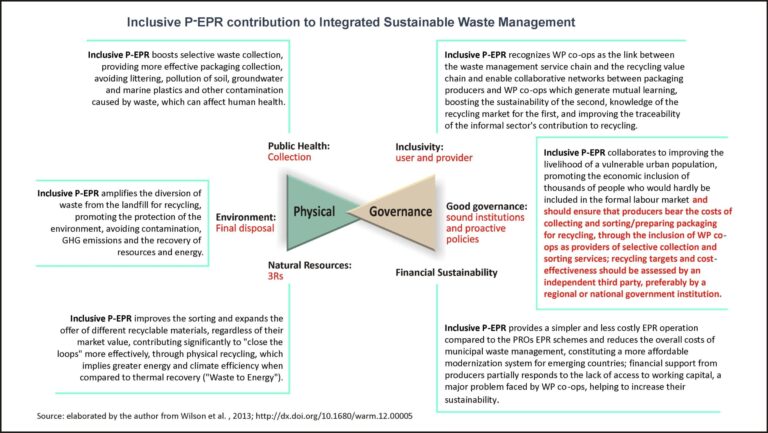Result description
In the Inclusive P-EPR scheme, WP organized into cooperatives, collect household packaging and prepare waste for recycling in their collective sheds, acting as the link between the WM service chain and the recycling value chain. In this model, they improve their working conditions and reduce the transaction costs of their activities. It is proposed to formalize the WP co-ops as providers of selective collection services for local authorities (LA) and as providers of sorting and pre-treatment services for recyclables for packaging producers. Due to improving the municipal WM and the livelihoods of a vulnerable urban population, the scheme results in an affordable and efficient alternative to the implementation of ISWM in emerging countries.
Considering the polluter pays principle that underpins EPR schemes, packaging producers must finance the system, paying fees that must bear most of the total costs of both services.
The organization of the WP in cooperatives must be fostered by social interventions implemented by non-governmental organizations in association with LA, supported by social-solidarity economy policies in cooperation with WM policies.
Addressing target audiences and expressing needs
- To raise awareness and possibly influence policy
- Grants and Subsidies
- Help in technical expertise
- Collaboration
- Fellowship to advance my/our research
Academy could collaborate in the dissemination of appropriate management methodologies and tools to support WP capacity building and provide results assessment of inclusive P-EPR schemes in different countries.
Despite having a deep knowledge of waste recycling, WP have a low educational level, which makes it difficult to organize their businesses. They also lack access to capital for investment.
Policy makers and internatl. organizations should create public policies to aid the development and sustainability of WP co-ops, and with funding institutions, support the dissemination of the model.
- Public or private funding institutions
- EU and Member State Policy-makers
- International Organisations (ex. OECD, FAO, UN, etc.)
- Academia/ Universities
Result submitted to Horizon Results Platform by UNIVERSITY OF LEEDS

